2009-12-22 | Season's Greetings
The Knowledge Media Research Center would like to wish all its partners and friends a Merry Christmas time, nice holidays and a Happy New Year 2010!
The Knowledge Media Research Center would like to wish all its partners and friends a Merry Christmas time, nice holidays and a Happy New Year 2010!
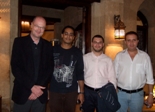
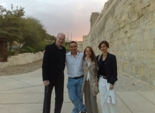
Prof. Dr. Stephan Schwan, deputy director of KMRC Tuebingen and leader of the research unit "Knowledge Acquisition with Cybermedia", Dr. Carmen Zahn and Manuela Glaser visited the Center for Documentation of Cultural and Natural Heritage (CULTNAT) in Cairo in late November.
On this occasion the scientists from Tuebingen met with Prof. Dr. Fathi Saleh (Director at CULTNAT), Sherif Farahat (Training
Manager) and Karim Omar (Head of the Computer Graphics Unit) to talk about possible cooperations among both institutions; with special interest in a digital database of the cultural heritage of Egypt or virtual animations of historical equipment and engines, see www.eternalegypt.org. In the focus of the visit was also the potential to explore an impressive multimedia and interactive presentation technique called CULTURAMA that makes even possible an 180 degree-view.
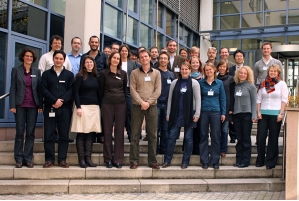
The Knowledge Media Research Center and the Centre for European Economic Research (ZEW) hosted an interdisciplinary workshop for talented junior researchers from the field of economic and psychological research.
In Mannheim, they presented their current work and discussed approaches for interdisciplinary research on social software (such as wikis, blogs, social tagging tools, and social networks), and other interactive web applications. The keynote speakers were Alessandro Acquisti (Carnegie Mellon University, USA) and Tom Postmes (University of Groningen, the Netherlands and University of Exeter, UK).
The workshop was also a kick-off for the KMRC- ZEW cooperation within the WissenschaftsCampus Tuebingen.
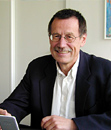
The talk "Use and acquisition of externalized knowledge" by Prof. Hesse is one of three keynotes invited to EC-TEL 2009 in Nice. On October, 2nd, the speaker will address paradigmatic changes in learning research and highlight the potential of the so-called "Social Networks" and "Social Software Tools".
Hesse is going to show that such tools can serve as a bridge between formal and informal education. He states that the nature of the new information resources has changed the way we do (peer) teaching as well as the way how we learn from each other. To make use of the tool's potentials for educational purposes, we have to understand their underlying mechanism.
The speaker, Prof. Friedrich W. Hesse, is director of the KMRC, an extra-faculty research organization located in southern Germany, dealing with knowledge acquisition, its exchange, and communication within innovative technologies. He is also holding the chair of applied cognitive psychology and media psychology of the University of Tuebingen, Germany, and is initiator and speaker of the first WissenschaftsCampus (Science Campus) in Germany.
New project on "Patterns and Tools for Non-Governmental-Organizations" (in short: PATONGO) aims at the investigation of circumstances for efficient knowledge communication in larger non-governmental organizations. By the case of the Evangelische Kirche Deutschland, the exchange of good practices and the development of a common organizational knowledge structure with the use of web 2.0 technologies will be investigated and optimized within a large non-governmental organization.
The cooperation project with the FernUniversitaet Hagen and the Evangelische Kirche Deutschland (EKD) has a duration of three years. It is funded by the Federal Ministry of Eduation and Research and the European Social Fund. At KMRC, the project is part of the research unit "Design and Implementation of Integrative Learning Environments". For further information, please contact Prof. Dr. Ulrike Cress.
The Knowledge Media Research Center (KMRC) and the Centre for European Economic Research (ZEW) are pleased to announce an interdisciplinary workshop for talented junior researchers from the field of economic and psychological research to present their current work and to discuss approaches for interdisciplinary research on social software (such as wikis, blogs, social tagging tools, and social networks and other interactive web applications).
Keynote Speakers: Alessandro Acquisti (Carnegie Mellon University, USA) and Tom Postmes (University of Groningen, The Netherlands and University of Exeter, UK).
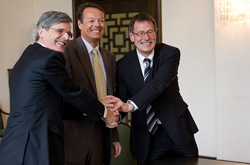
Human Development, Learning, and Education in Informational Environments is the topic the first WissenschaftsCampus in Germany deals with. The cooperation between the Knowledge Media Research Center Tuebingen and the University of Tuebingen is a strategic initiative to make use of existing expertise in the field of knowledge acquisition, knowledge exchange and knowledge communication with innovative technologies and of broad academics offering by the University of Tuebingen. The aim is to integrate it into common research foci and establish new structures to strengthen the empirical educational and media research in Tuebingen. At the opening ceremony, on April 20th, the partners officially signed and cooperation treaty.
For further information about the WissenschaftsCampus Tuebingen, please visit the official website of the project:
http://www.iwm-kmrc.de/www/en/forschung/WissenschaftsCampus/index.html

Rising is regarded as an outstanding expert in the field of patterns. Patterns describe recurring elements of successful applications. Patterns originated as an architectural concept by Christopher Alexander (1977) to label successful practices, the so- called pattern language. Rising's latest book "Fearless Change: Patterns for Introducing New Ideas" deals with patterns in the field of change management.
The lecture takes place January 29th, 5 pm at KMRC Tuebingen. The interested general public is invited to join. Free entry.